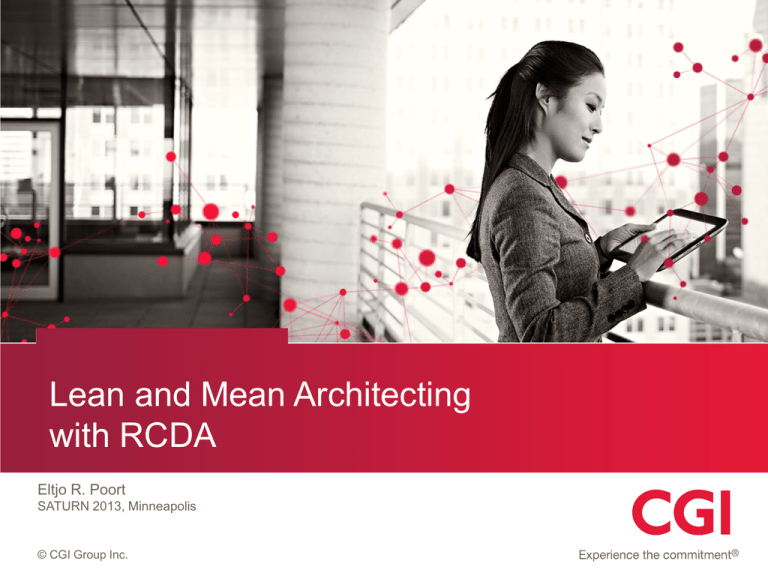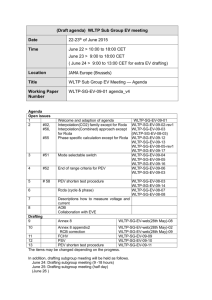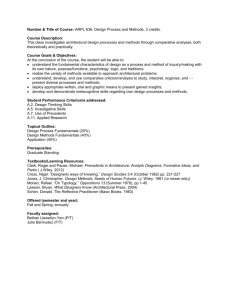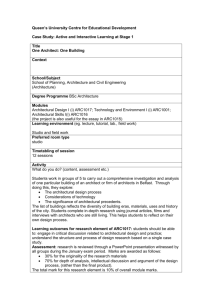Lean and Mean Architecting with RCDA Eltjo R. Poort SATURN 2013, Minneapolis
advertisement

Lean and Mean Architecting with RCDA Eltjo R. Poort SATURN 2013, Minneapolis © CGI Group Inc. Eltjo Poort CGI NL Lead Expert Architecture • Reviewing Bids & Projects • Standardising & Improving Architecture Practice in CGI NL GGI Architecture Community of Practice lead Researcher • Improving Architecture Practices • With Universities (VU, Twente, Utrecht, Eindhoven) • Member if IFIP WG 2.10 Software Architecture Back to Basics in Software Methodologies …a process…that include[s] a kernel of widely-agreed elements, extensible for specific uses. [SEMAT initiative, 2010] Maybe we should try “lean and mean” software process models, rather than making them “richer.”….start from what people do … and not from what we think a priori they should be doing. [Kruchten, 2011] These calls resonate with the way Logica/CGI has been improving Solution Architecting practices since 2007. Why Solution Architecture? SaaS Infra SOA App Technology Solution BPO For some of the things we architect, “Software” Architecture is a stretch: • software application • software as a service • embedded system Environment • system of systems • systems integration Business Process • BPO solution • full service solution Information Systems • full IT outsourcing • … Solution Architecture approach Key characteristic A good Solution Architecture approach fills the gap between: • Enterprise Architecture approaches • TOGAF, IAF, Zachman… Strong on principles & governance × Weak on transformation & implementation • Technical Architecture approaches • E.g. Software / Infra / SOA (RUP, ATAM…) Strong on design & implementation × Weak on crosstechnology stakeholder concerns Risk- and Cost Driven Architecture RCDA history until now Architecture Community of Practice founded • Architecting Process initiative ‘07 RCDA 1.0 released • Solution Architecture Practitioner Course (NL, >100 trained) ‘09 Risk- and Cost Driven Architecture initiative (Group Technical) • Process set of practices ‘10 RCDA 1.2 • Major presentation improvements • Key practice extension ‘11 RCDA 1.1 Solution Architecture international training starts based on RCDA • Group-wide ratification ‘12 ‘13 RCDA 1.3 • RCDA as CGI proposition Basis of Risk- and Cost Driven Architecture Extensive experience in Solution Assurance • Reviewing 100s architectures in bids and projects Industry Leading Architecture visions • SEI, TOGAF, IBM Research in Architecture Knowledge Management • Focus on Architectural Concerns & Decisions Feedback from CGI Architect Community Network RCDA is a Practice repository Practice: a light-weight, proven way of addressing a problem • see e.g. EssUP (Ivar Jacobson) • more pragmatic than processes • easier to maintain • more fine-grained • more flexible • easily applicable in any process/organisation • fit in existing sales/design/development processes • avoid need to adopt complete new process Practice repository: stores practice descriptions and associated documents (templates, guidelines, checklists, examples…) Key Principles of RCDA Cost and Risks drive architecture • highest impact on cost and risks of the system and its delivery • architect should be an expert on costing and risk mitigation Architecture should be minimal • to keep overview of the whole system • Solution Architect should limit to decisions with critical impact • leave a maximum of design space for developers Architecture as both Blueprint and Decisions • decisions leading to architecture and the underlying rationale are essential Solution Architect as Decision Maker • critical architectural decisions are made by one person with overview of whole system • requires authority and subject matter skills and knowledge What is architecture about? “Fundamental concepts or properties of a system in its environment embodied in its elements, relationships, and in the principles of its design and evolution”. [ISO/IEEE] “Architecture is about the important stuff. Whatever that is.” [Fowler] After talking to architectects and stakeholders on dozens of projects, we have come to equate the “important stuff” with the stuff that has most impact on risk and costs. Important high risk and cost architectural significance The Architect’s Daily Job Architecting Microcycle Identify & prioritise architectural concerns Decide best fitting solution • What problems should I work on? • What are my options? • I’ll pick this one Research possible solutions Solution Architect The Architecting Microcycle Identify & prioritise architectural concerns Decide best fitting solution Research possible solutions The Architecting Workflow Architectural concerns (backlog) Architectural decisions Identify & prioritise architectural concerns Decide best fitting solution Research possible solutions Building Up the Core Architecting Process Core Practices Architectural Requirements Prioritisation Solution Selection Applying Architectural Strategies Architecture Documentation • • • • • • • What problems should I work on? What are my options? I’ll pick this one Write down what I want What is this going to cost? Is this really going to work? Let’s do it! Solution Costing Architecture Evaluation Architecture Implementation Solution Architect Architecture Maintenance Adding Supporting Practices Core Practices Architectural Requirements Prioritisation Supporting Practices Stakeholder Workshop Dealing with NFRs Requirements Convergence Plan Architecture Roadmapping Solution Selection Solution Shaping Workshop Applying Architectural Strategies Cost-Benefit Analysis Architecture Documentation Documenting Architectural Decisions Solution Costing Architecture Evaluation Independent Architecture Assessment Architectural Prototyping Supplier Evaluation Architecture Implementation Architecture Maintenance Technical Debt Control RCDA Practice Sets and Lifecycles Core Practices Supporting Practices RCDA Core Process Requirements Analysis Stakeholder Workshop Architectural Requirements Prioritisation Lifecycles Waterfall Project Dealing with NFRs Requirements Convergence Plan RUP Software Development Architecture Roadmapping Agile Development Solution Shaping Bid Solution Selection Solution Shaping Workshop Applying Architectural Strategies Cost-Benefit Analysis Architecture Documentation Documenting Architectural Decisions Solution Costing Architecture Validation Architecture Evaluation Independent Architecture Assessment Architectural Prototyping Supplier Evaluation Architecture Fulfillment Architecture Implementation Architecture Maintenance Technical Debt Control Blended Delivery Enterprise to Solution key Practice Set RCDA in Context Actor External Activity Product Repository Roadmapping Costing RCDA Solution Architecting Solution Presentation Requirements Analysis Decision Management Requirements Management Service Higher Level Architect Solution Assurance Solution Shaping Architecture Validation Architectural Asset Base Architecture Fulfillment Solution Reviewer Architectural Asset Management Realisation Asset Architect Transition Transformation Primary flow Higher Level Architecture Requirements Definition Risk Management Project Stakeholders Responsible Solution Architect Environment RCDA Survey Results October 2011 • 60% of architects report increased effectiveness after RCDA training • 77% of lead architects report increased effectiveness RCDA: Solution Architecting as a Risk- and Cost Management Discipline, Eltjo R. Poort and Hans van Vliet, Journal of Systems and Software (2012) .Application of RCDA guidance after training RCDA is Lean, Mean and Agile Practices (core and extensions) make RCDA Lean Risk and Cost focus make RCDA Mean Architectural Decision Microcycle makes RCDA Agile 20 21 Solution example: Mobile Application Athletes use app to register their location for Anti-Doping Authority. Used by 58% of Dutch athletes at 2012 Olympics. • App on Android, Apple, Blackberry. • Server platform & back-office software. • Maintenance & support. Solution example: Software Application ($1.5M) State Government Election Count System Delivery Scope: • Architect & design software & hardware platform • Development (Microsoft .net) • Installation and configuration on client’s hardware • Warranty & support Solution example: Outsourcing (70M€, 7yr) Bugle Bank Full IT Outsourcing Bugle Bank End Users Click Web Email Demand Management Single Point of Contact Enterprise Services 1st/2nd Line 3rd Line Functional Call Support Banking Voice Applications Fax BPO IT AM (Technical Support) IT IM (Office, Telephony, Servers) Third Parties 4th Line Support Architecture Lifecycle UP Software Development Dealing with NFRs Requirements Convergence Plan Architecture Documentation Inception/Elaboration phase Supplementary Specification Elaboration Phase planning Software Architecture Document Architectural Requirements Prioritisation Solution Selection Addressing architecturally significant requirements Applying Architectural Strategies Architecture Evaluation Elaboration Phase exit criteria Architecture Roadmapping Construction/Transition phase Iteration planning Architecture Implementation Architecture Maintenance Technical Debt Control Ensuring compliance with SAD by developers Coordinating integration Testing architectural requirements Managing architectural change Architecture Lifecycle Enterprise Architecture to Solution Architecture • Solution: part of transformation under EA • Gap from actual to target enterprise architecture • EA Requirements + Architectural Guidance • Part of Higher Level Architecture • Project Start Architecture (DYA)? • EA may prescribe views • Business, Information Systems, Technology • Involve Enterprise Architects as Stakeholders • Briefings, workshops, reviews • Independent solution reviewers? 26




